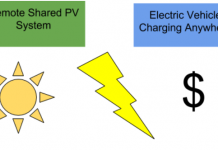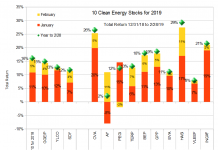Green Energy Investing For Experts, Part IV
Tom Konrad, CFA
Mass air travel is incompatible with a sustainable economy. Air travel is energy and capital intensive, creates a gigantic carbon footprint, and is likely to remain dependant on the high energy density of fossil fuels much longer than surface transport. As such, it is a prime candidate for the short side of a clean energy portfolio.
I’m writing this post on a United Airlines (UAUA) flight from Baltimore to Denver in a seat that cost me $99, plus $15 to check a bag. One sign of the economic unsustainability of flying me and my luggage at 8 cents a mile is airlines increasingly undignified scramble for marginal revenue, like that charge for checked baggage.
My flight left a half hour late because of airlines’ desperate attempt to raise more revenue without raising prices by charging for checked baggage. This has the unintended but unsurprising consequence of encouraging people to bring larger and more carry-on baggage, and spend more time wrestling it into the overstuffed overhead bins.
Because most airlines are now charging for checked bags, it will be difficult for an airline to switch to a more rational policy that does not encourage passengers to bring excess carry-on baggage causing needless delays without making their prices seem relatively more expensive than their competitors. (It’s interesting, if not statistically rigorous, to note that JetBlue (JBLU) does not charge for the first checked bag, and Southwest (LUV) does not charge for the first two. Both usually seem to be among the best airlines for on-time departure rates.)
Airlines blamed an increase in flight delays on weather in October. I blame it on the increase in passenger awareness of the increased cost of checking bags. In the short term, dropping ticket prices and charging for baggage will probably create a boost for airlines bottom lines. In the long term, delays and strained backs from packing fewer, heavier bags can only decrease demand for air travel, just as the indignities of airport security have already made many potential passengers think twice when considering air travel.
The Icarus Industry
The above rant about checked baggage is just an example. Airlines’ economic woes are longstanding. Airlines’ current pursuit of short term revenues at the expense of the industry’s long-term viability is more a symptom than a cause of industry woes. Rather, the problem is chronic over-investment (by both private investors and governments) in the airline sector. Flight has a visceral emotional appeal to humans, and industries with emotional appeal attract both government support and investment dollars, even from investors and governments who should know better.
With nearly unparalleled emotional appeal, the airline industry has been in a state of chronic oversupply practically since its inception. This deprives airlines of pricing power, and makes it impossible for the industry to recoup its true costs over the long term. Over its entire 120 year existence, the airline industry has racked up a net loss. I think the Financial Times aptly summarized the consequence of these horrible economics in the line: "Grown up investors avoid the airline industry."
Peak Oil
As bad as the history of the airline industry has been, I expect the situation to get worse over the next few years. As we’ve seen since 2008, air passenger demand is highly sensitive to the health of the economy. Hopes of economic recovery are seen by industry insiders as key to a "return" to industry profitability. But in the current era of tight oil supplies, economic recovery will boost demand for oil, and raise the price of jet fuel, airlines’ single largest cost category. The following slide is taken from a 2004 presentation by Dr. Chris Smith of SH&E, an airline consultancy [pdf.] With oil prices now around $70 a barrel, we will have seen another increase in the fuel cost category almost as large again as the rise shown.

My $114 flight on a Boeing 757 from Baltimore to Denver alone used about 18 gallons jet fuel (using numbers from here). Unlike motorists, airlines pay little or no tax on jet fuel, meaning that any increase in oil prices will cause a much larger percentage increase in airline operating costs than it does for ground transportation.
In short, airlines are a major source of marginal demand for oil. Since the realities of peak oil constrain the expansion of supply, increases in demand for oil fueled by economic growth or decreases in supply caused by depletion must be matched to decreases in demand somewhere in the economy. Air travel’s profligate use of oil and relative price sensitivity mean that the industry will continue to reduce consumption faster than other transport sectors. Given slow turnover in the airline fleet and stagnant efficiency improvements, most of the decrease in oil use will have to come from a decrease in passenger miles traveled.
Substituting alternative fuels for oil is also unlikely to help the economics of aviation. A recent Rand study states, "Early in our study, we recognized that certain fuels may be more appropriate for automotive applications than for aviation. Moreover, supplies are limited for nearly all the alternative fuels we examined." (Thanks to Jim at The Master Resource Report.) In other words, alternative fuels don’t solve the underlying problem of not enough liquid transportation fuel to go around.
There’s also the real chance that airlines will not only have to deal with peak oil, but climate change legislation as well. Even if a global tax on air travel does not come out of the Copenhagen summit, airlines are an easily identifiable target for lawmakers and other groups interested in reducing global warming emissions.
None of this will not be good for airline stocks, making the industry a prime candidate for the short side of a green portfolio, the focus of this series. (So far, I’ve also looked at the Mexican economy, and Shale Gas.)
How to Short Airlines
There is an airline sector Exchange Traded Fund (ETF), the Claymore/NYSE Arca Airline ETF (FAA), but, as I found with the iShares MSCI Mexico Index Fund (EWW), it is not widely held, and shares are not available for shorting. Like Mexico, but unlike shale gas, I expect peak oil to erode the economics of aviation over time, and I think this erosion is fairly likely. Hence, my preferred instrument is to short a stock in combination with a long call on the same stock, and my second choice would be a short call spread. (See the Mexico entry in this series for my reasoning.)
In the case of EWW, I chose to use a short call spread, because most of the EWW’s holdings are not traded on US based exchanges, and so I would also have had trouble obtaining individual Mexican shares to short. In contrast, many airline shares are widely traded and held, so, rather than selling a short call spread that might require me to cover in haste if an early exercise left me in a short position without available shares to borrow, and so I chose to short individual airline stocks.
Since I’m not an airline industry expert, I wanted to short a representative sample of the airline industry similar to what I would have found if I were to short FAA, so selecting airline stocks to short was as simple as picking the largest holdings of FAA.
The top three holdings are Delta Air Lines (DAL) at 16.6%, AMR Corp (AMR) the parent of American Airlines at 16.3%, and Southwest Airlines (LUV) at 14.7%. Beyond these three, the next largest holding is United Air Lines (UAUA) at only 4.4%. Since the top 3 holdings compose 47.6% of the ETF, shorting these three should provide most of the diversification benefits of shorting FAA, but with much better liquidity. While FAA trades an average of 21 thousand shares a day, Delta, AMR, and LUV trade about 12, 18, and 9 million shares a day, respectively. They are also all widely held, making it simple to borrow shares to short, and exchange traded options expiring in January 2012 are available. In contrast, the longest-dated options available on FAA are for June 2010.
Since airlines are one of the least green and most energy intensive forms of transport, a green investor should seriously consider shorting DAL, AMR, and LUV (combined with appropriate out-of-the-money long calls) as an investment in efficient transport.
DISCLOSURE: Short EWW, UAUA, AMR, DAL, and LUV.
DISCLAIMER: The information and trades provided here and in the comments are for informational purposes only and are not a solicitation to buy or sell any of these securities. Investing involves substantial risk and you should evaluate your own risk levels before you make any investment. Past results are not an indication of future performance. Please take the time to read the full disclaimer here.









Climategate is going knock the “green” movement and its scam business off the map.
I chose to publish the above comment because it’s important to understand the people who are taking the other side of the trade. As long as there are people who refuse to understand the compelling fundamentals of green energy, there is a chance to outperform the market by profiting from their mistaken ideas about the shape of the future of energy.
Tom,Thanks for another provocative and informative post. I agree with you on:
1. Publishing the comment.
2. The potential impact of peak oil in general.
3. The large impact of fuel prices on aviation costs.
4. The impact on profitability of excess industry capacity.
5. The impact of “dumb” marketing and revenue generation decisions.
6. Airlines as a major potential target for taxation/restrictions due to climate change.
As such, shorting airlines as a trade can be very effective. However, I don’t think it is “a slam dunk”.
For example:
1. You mention “Air travel’s profligate use of oil” and “My $114 flight on a Boeing 757 from Baltimore to Denver alone used about 18 gallons jet fuel”. Baltimore is about 1500 miles from Denver. So, you achieved fuel efficiency better than 80 “seat mpg”. Not too many vehicles in the USA auto fleet presently beat that. And, none will transport you that distance in 3 hours (or even 6 hours to include pre and post air travel activities). Although rail could provide better fuel efficiency, you still have the issue of travel time.
2. Any climate change “tax” will have minimal, if any impact in the time frame covered by the LEAP options you mentioned.
3. Next generation aircraft, e.g. 787, may reduce fuel consumption up to 20%.
4. Relatively straight forward changes to operations and scheduling could be quite beneficial to fuel efficiency with relatively low cost (although some may require changes to FAA and airport equipment and procedures). Options in this category include slightly slower speed, less time on taxiway and reduced time in airport hold patterns.
5. Relatively straight forward equipment changes could also provide fairly quick payback in a high fuel cost environment. These include, for example, fuel cell APU, electric drive nose wheels for taxi activities, light weight seating, etc.
6. It is unlikely the auto fleet will be more fuel efficient than air travel anytime in the next two decades.
7. Teleconferencing, although improving and more broadly accepted, will not replace key business or personal travel anytime soon.
8. The airline and aircraft industries are actively developing alternative fuels.
On the other hand, your mention of Jet Blue and Southwest is important. There have been a few airlines that have prospered during the recent turmoil. These appear to distinguish themselves with their business operations.
So:
1. Yes airlines will be impacted by fuel costs.
2. Yes airlines can be very attractive shorting candidates.
3. A “broad brush approach” is probably inappropriate.
4. The timeframe for substantial impact may be beyond the window of available LEAPS.
Mike-
Driving across the country alone in a vehicle is also a “profligate use of oil.” It’s easy to get better than 80seat miles/gal by putting more than one person in a vehicle (2 people in a Prius or 8 people in a Hummer), or taking the bus. Yes, airlines are much higher quality rides because of the speed (at least for longer trips… security makes shorter trips not particularly fast.)
The time frame is not when the fuel prices will have the impact, but when investors realize that they will have an impact. This may indeed take more than 2 years, and the call options should be rolled over to longer dated ones before they expire.
Regarding the more efficient operators like LUV and JetBlue, you may be right. As I say in the article, I simply know that I don’t know enough about the airline industry to decide which airlines will be most effective, although my guess is that airlines with the most short-haul flights may be hit hardest, since that is where alternatives such as ground transport compete best.
Tom,
Thanks for your response.
Certainly you are correct that on a seat mile basis a number of cars can provide better fuel efficiency and more comfort than a plane. (However, I’ll forgo being one of the 8 in the Hummer, thanks.) The reality is that, except for rare situations, this is not the case. People don’t fill the cars.
And, I agree that the important time frame is not when fuel prices impact aviation. It isn’t even when investors “realize” it, which implies a factual basis. Rather, it is when they think it. When will that be? With a substantial portion of Americans still in denial about climate change or the anthropogenicity of it, I vote that it will be “a while” yet.
Having said that, a just released study indicates that aircraft emitted carbon black is an enormous contributor (much more than thought) to warming. If confirmed, I expect a major push to switch within a decade to cleaner engines and fuels and to implement a number of the activities I mentioned previously. The benefit could be substantial. The impact would be focused on air travel and would be fairly defined. I suspect that air travel will cost twice as much by 2020. This will impact some airlines. But, on the whole, such an increase would be very manageable.
Regarding LUV & JBLU being more “efficient”, I would argue it is much more than that. As one specific distinguishing example, look at the fuel hedging that LUV implemented. It substantially shielded the company from last year’s price spike. Many of the other airlines were not so fortunate.
Part of the reason I am focusing on this is that one of your potential short candidates was LUV because it has a major position within the airlines etf. Personally, if I saw that ETF fall, I would consider buying LUV, or placing a pairs trade, buying ETF puts and buying LUV on the dip.
Mike,
You’re not the only one who LUVes Southwest and has pushed the long LUV/short other airlines trade, and everything you say about it is true.
LUV has an extremely strong reputation, due to many smart moves in the past, including fuel hedging and sane baggage policy.
However, what everyone knows is almost always already discounted by the market. Because of its strong reputation, LUV has even farther to fall if it slips up.
Regarding loading factors for cars on long trips, my anecdotal experience is that people usually travel two or more to a car on long trips, because it makes the driving easier and the economics better… but that’s just anecdotal.
Long term liquid hydrogen may be a practical fuel for airliners. Peak oil will not be the end of air travel, but will require a major overhaul of the industry.
Larry,
If it’s not liquid H2, it will be some other fuel. I agree that air travel will be here to stay. Cheap air travel, on the other hand, will go the way of the dodo.
Great Article – I wonder if you could speak more about Brazilian based sugar-ethanol energy. It is in testing to fuel aircraft some time in 2012. By reading this article it seems a great alternative fuel is at our finger tips, yet corporate America keeps getting in the way. Thanks http://mises.org/daily/3934
Justin,
I’m not sure I follow you as to why you’re so optimistic about new jet fuels.
All biofuels have problems:
1- limited supply because they require land… much more than other renewables (except maybe algae)
2- associated environmental degradation (if we chop down rainforest to plant sugarcane for ethanol, we’ve added carbon to the atmosphere)
Sugarcane is much more productive than any other current source of biofuel, but our (world) demand for oil will overwhelm that even supply. Limited supply means that biofuel prices will be set by the oil price, which means that our current way of life will still be expensive.
Not to say that you can’t invest in Brazillian ethanol. the best stock I know for this is Cosan (CZZ), although I have not looked at the valuation recently.